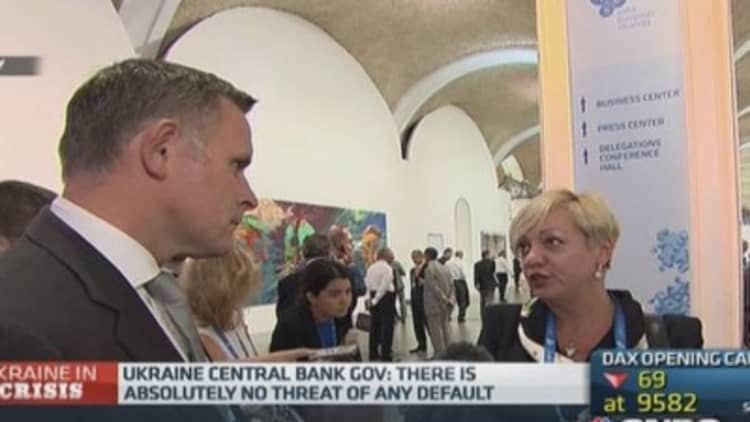
The central bank governor of Ukraine has dismissed fears of a default, even as she predicted the economy could contract as much as 10 percent and the country is said to be facing a Greek-style debt controversy.
The Ukrainian economy has deteriorated dramatically this year as tensions with Russia have flared and the currency has continued a free fall against the dollar, but Ukraine central bank governor Valeria Gontareva said the country would not need further bailouts.
Read MoreUkraine vows return to union with Crimea
"Unfortunately right now because of really drastic deterioration of economic conditions I suppose that we will revise the program and I suppose that it could be even minus 9, or even 10," Gontareva told CNBC.
"It will be maybe some small adjustment, not necessarily to take any serious steps in changes of the (IMF) program," she said.
The International Monetary fund agreed to a $17 billion bailout program for Ukraine in April, but the fund warned earlier this month the country could need as much as $19 billion in additional international financing if fighting continued in the eastern part of Ukraine.
Read MoreWhy Middle East is abigger risk than Russia
Dollar denominated Ukrainian bond yields have also climbed to unsustainable levels, with yields on 2023 paper exceeding 10 percent.
Gontareva said the IMF program had already factored in the country's bond liabilities, so no restructuring is necessary.
But head of global macro investor relations at Oxford Economics, Gabriel Sterne said Ukraine's debt levels currently looked unsustainable, predicting a default for November 2015.
Read MoreFood prices hit 4-year low, Russia ban hurts
Ukraine's shorter-dated maturities are more likely to be paid out, but holders of longer-dated maturities are at risk of a haircut, Sterne said.
"Greece's default was triggered by a too-big-to-pay bond. The date was shortly before the 12 billion euro ($15.5 billion) maturity in March 2012. We think Ukraine's mostly likely default date is November 2015, shortly before the Russian-held bond matures on 20 December," he said.
Ukrainian Prime Minister Arseniy Yatsenyuk said a more permanent peace deal needed to be negotiated with Russia, involving the U.S. and Europe, in order to create economic growth.
Read MoreGreek debt upgraded to 'B' by S&P; Recovery 'weak'
"The plan is to get the real peace and to get the peace we need to have Geneva-format talks with the U.S., the EU, Ukraine and Russia because the ceasefire is just the first step which could lead to the peace deal," Yatsenyuk told CNBC.
"The second one is to urge Russia to pull back its military forces and its Russian-led terrorists. The third one is to restore the control over Ukrainian Russian borders. The fourth one is to pass a snap parliamentary election. The fifth one is to form the new government. And the last but not least is to have the strong political will and desire for political changes," he said.
—By CNBC's Jenny Cosgrave: Follow her on Twitter @jenny_cosgrave



